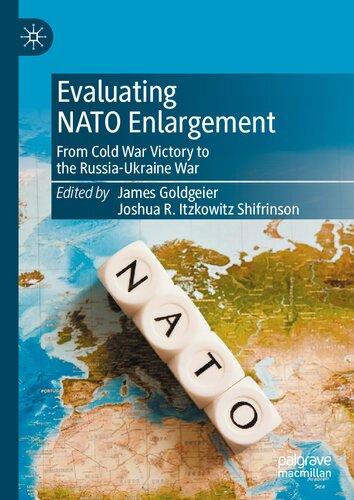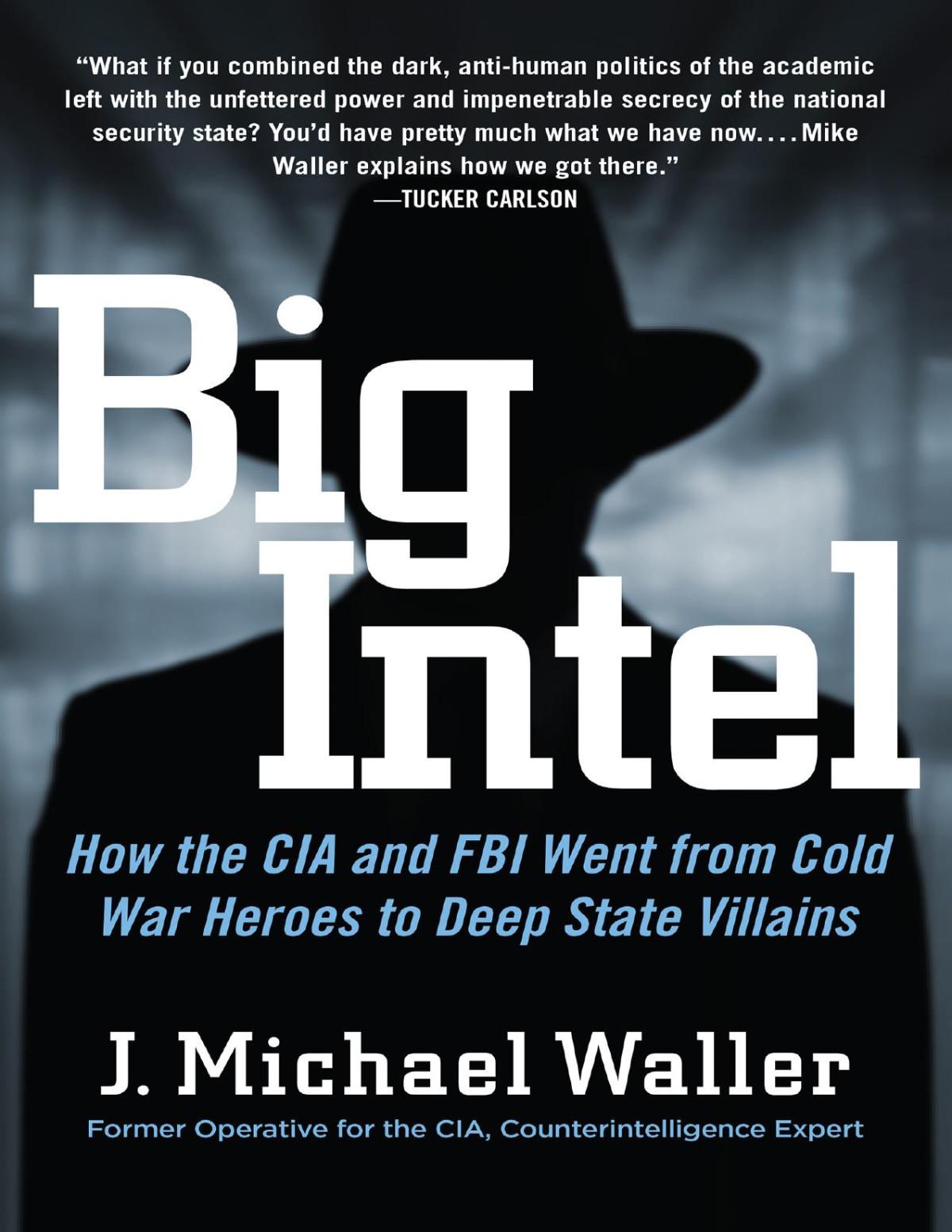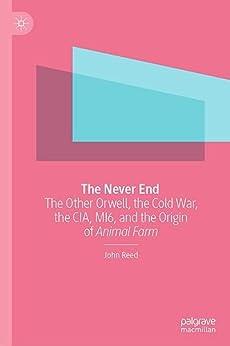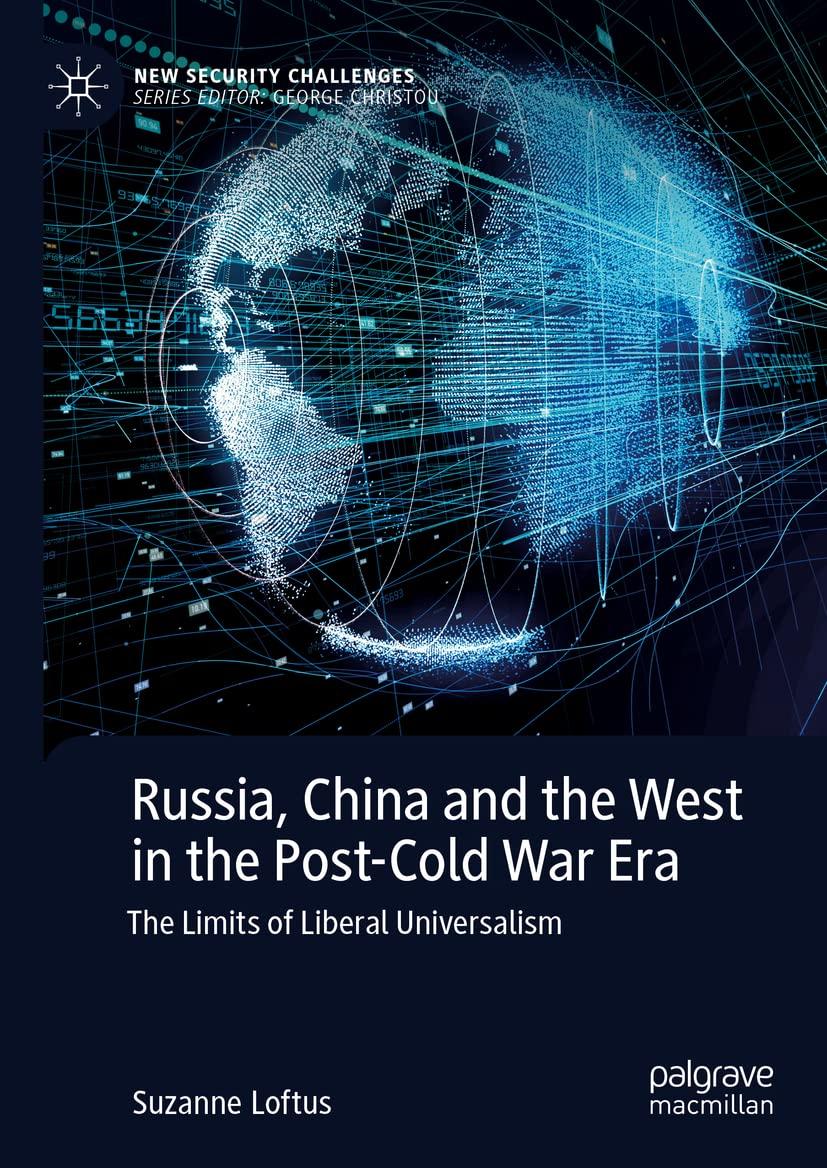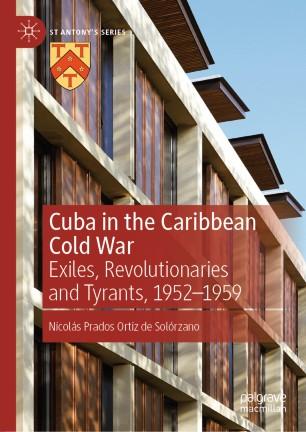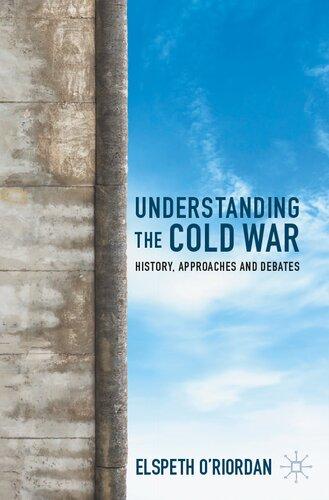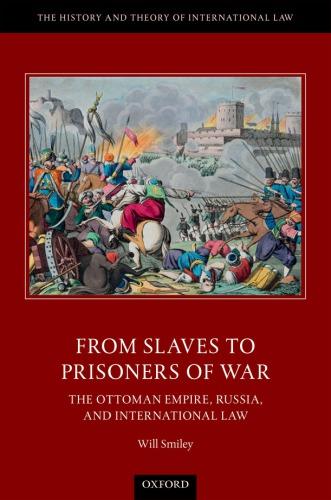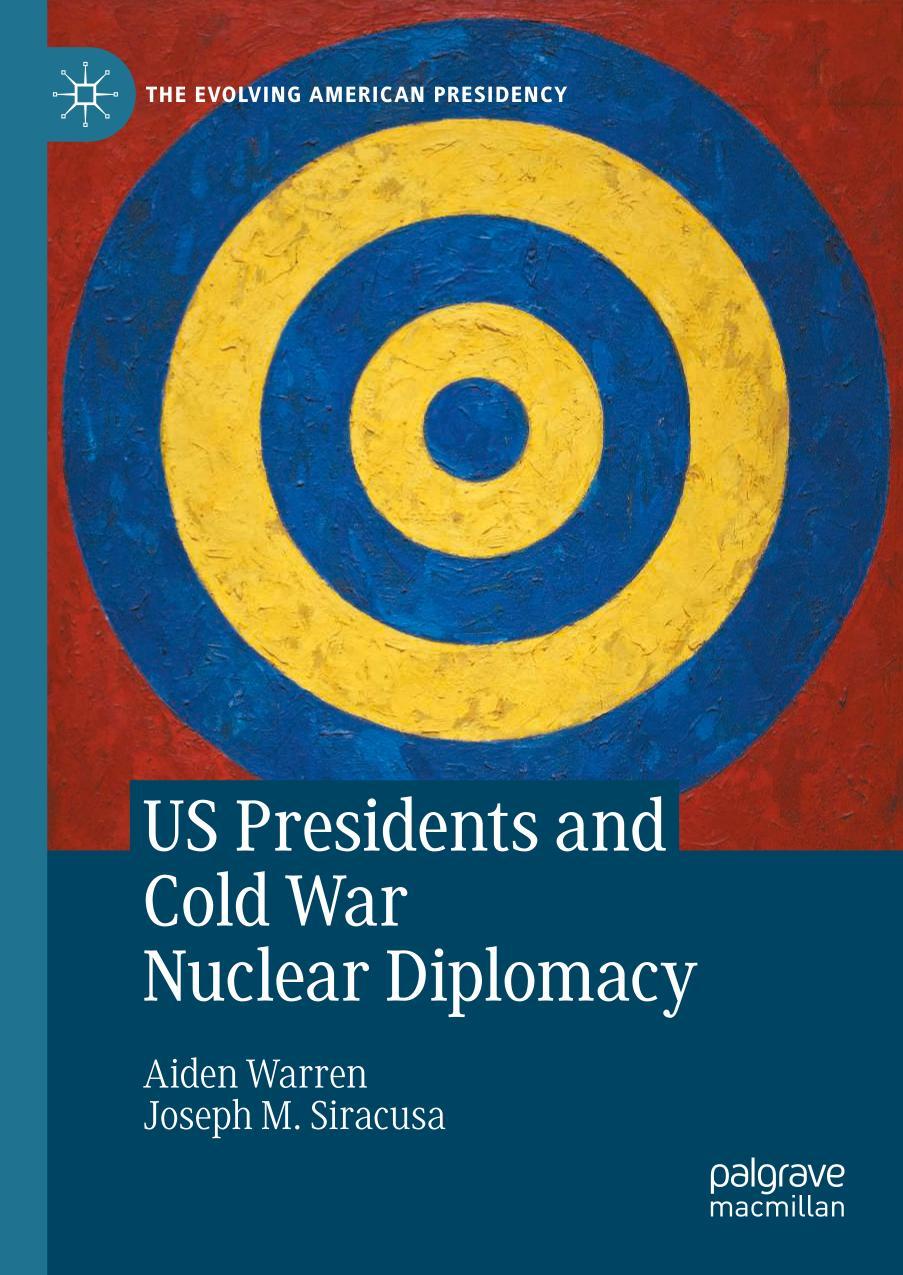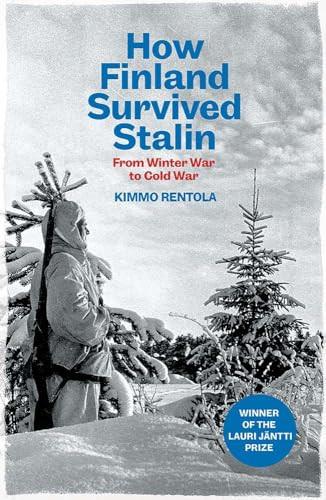Cold War Exiles And The CIA: Plotting To Free Russia Benjamin Tromly Visit to download the full and correct content document: https://ebookmass.com/product/cold-war-exiles-and-the-cia-plotting-to-free-russia-ben jamin-tromly/
More products digital (pdf, epub, mobi) instant download maybe you interests ...
Evaluating NATO Enlargement: From Cold War Victory to the Russia-Ukraine War James Goldgeier
https://ebookmass.com/product/evaluating-nato-enlargement-fromcold-war-victory-to-the-russia-ukraine-war-james-goldgeier/
Big Intel: How the CIA and FBI Went from Cold War Heroes to Deep State Villains J. Michael Waller
https://ebookmass.com/product/big-intel-how-the-cia-and-fbi-wentfrom-cold-war-heroes-to-deep-state-villains-j-michael-waller/
The Never End: The Other Orwell, the Cold War, the CIA, MI6, and the Origin of Animal Farm John Reed
https://ebookmass.com/product/the-never-end-the-other-orwell-thecold-war-the-cia-mi6-and-the-origin-of-animal-farm-john-reed/
Russia, China and the West in the Post-Cold War Era: The Limits of Liberal Universalism Suzanne Loftus
https://ebookmass.com/product/russia-china-and-the-west-in-thepost-cold-war-era-the-limits-of-liberal-universalism-suzanneloftus/
Cuba in the Caribbean Cold War: Exiles, Revolutionaries and Tyrants, 1952-1959 1st ed. Edition Nicolás Prados Ortiz De Solórzano
https://ebookmass.com/product/cuba-in-the-caribbean-cold-warexiles-revolutionaries-and-tyrants-1952-1959-1st-ed-editionnicolas-prados-ortiz-de-solorzano/
Understanding the Cold War Elspeth O'Riordan
https://ebookmass.com/product/understanding-the-cold-war-elspethoriordan/
From slaves to prisoners of war: the Ottoman Empire, Russia, and international law Smiley
https://ebookmass.com/product/from-slaves-to-prisoners-of-warthe-ottoman-empire-russia-and-international-law-smiley/
US Presidents and Cold War Nuclear Diplomacy Aiden Warren
https://ebookmass.com/product/us-presidents-and-cold-war-nucleardiplomacy-aiden-warren/
How Finland Survived Stalin: From Winter War to Cold War, 1939-1950 Kimmo Rentola
https://ebookmass.com/product/how-finland-survived-stalin-fromwinter-war-to-cold-war-1939-1950-kimmo-rentola/
ColdWarExilesandtheCIA ColdWarExiles andtheCIA PlottingtoFreeRussia BENJAMINTROMLY GreatClarendonStreet,Oxford,OX26DP, UnitedKingdom
OxfordUniversityPressisadepartmentoftheUniversityofOxford. ItfurtherstheUniversity’sobjectiveofexcellenceinresearch,scholarship, andeducationbypublishingworldwide.Oxfordisaregisteredtrademarkof OxfordUniversityPressintheUKandincertainothercountries
©BenjaminTromly2019
Themoralrightsoftheauthorhavebeenasserted FirstEditionpublishedin2019
Impression:1
Allrightsreserved.Nopartofthispublicationmaybereproduced,storedin aretrievalsystem,ortransmitted,inanyformorbyanymeans,withoutthe priorpermissioninwritingofOxfordUniversityPress,orasexpresslypermitted bylaw,bylicenceorundertermsagreedwiththeappropriatereprographics rightsorganization.Enquiriesconcerningreproductionoutsidethescopeofthe aboveshouldbesenttotheRightsDepartment,OxfordUniversityPress,atthe addressabove
Youmustnotcirculatethisworkinanyotherform andyoumustimposethissameconditiononanyacquirer
PublishedintheUnitedStatesofAmericabyOxfordUniversityPress 198MadisonAvenue,NewYork,NY10016,UnitedStatesofAmerica
BritishLibraryCataloguinginPublicationData Dataavailable
LibraryofCongressControlNumber:2019934650
ISBN9780198840404
DOI:10.1093/oso/9780198840404.001.0001
Printedandboundby CPIGroup(UK)Ltd,Croydon,CR04YY
LinkstothirdpartywebsitesareprovidedbyOxfordingoodfaithand forinformationonly.Oxforddisclaimsanyresponsibilityforthematerials containedinanythirdpartywebsitereferencedinthiswork.
ForMaximandSasha,withloveandpride.
Acknowledgments Thisbookhasbeenmadepossiblethroughthehelpofmanykind,helpful,and intellectuallystimulatingpeople.Iowemygratitudetoseveralpeoplewhohave offeredfeedbackondifferentpartsofthemanuscriptindifferentphasesof development:OlegBeyda,KatharineEtsell,NormanJ.W.Goda,JohannaGranville,Anne-ChristineHamel,JohnLear,SimoMikkonen,Igor’ Petrov,PerAnders Rudling,andNinaTumarkin.EditorsatandanonymousreviewsforContemporaryEuropeanHistory,IntelligenceandNationalSecurity,andJournalofColdWar Studiesprovidedusefulcommentsonpartsofthetextthatwere firstpublishedin articleform.IhavealsobenefittedgreatlyfromthecommentsofferedandquestionsposedbyscholarsatthedifferentvenuesatwhichIhavepresentedworkfrom theproject:theCenterforEuropeanStudiesatLundUniversity;theEastEuropean HistorySeminarattheInstituteforHistoricalSciencesatHumboldtUniversity, Berlin;theEllisonCenterforRussian,EastEuropeanandEurasianStudiesat UniversityofWashington;theHarrimanInstituteforRussian,EurasianandEast EuropeanStudies,ColumbiaUniversity;theKennanInstituteattheWoodrow WilsonCenter;andtheResearchCenterforEastEuropeanStudiesatUniversityof Bremen.Ofcourse, flawsinthetextaremyresponsibilityalone.
Ialsothankthemanypeoplewhohaveofferedsupportandadviceofvarious kinds,withoutwhichthisbookwouldnothavetakenshape.Ihavebenefitted fromtheeffortsofseveralarchivistswhohaveansweredqueriesandofferedkind assistance,especiallyTanyaChebotarevatColumbiaUniversityRareBookand ManuscriptLibrary,ChristianDellitattheFederalCommissionfortheRecordsof theStateSecurityServiceoftheformerGermanDemocraticRepublic,Maria KlassenattheArchiveoftheResearchCenterforEastEuropeanStudiesatthe UniversityofBremen,LisetteMatanoatGeorgetownUniversityArchives,Anatol ShmelevattheHooverInstitution,andKathyShoemakerattheStuartA.Rose Manuscript,Archives,andRareBookLibraryatEmoryUniversity.Gelinada Grinchenko,EleonoraNarvselius,BenjaminNathans,MatthewRojansky, SusanneSchattenberg,andOlgaSveshnikovaweresupportiveofmyproject andhelpedmakeresearchonitpossible.CatherineAndreyev,RichardCummings,AnnaHolian,A.RossJohnson,AndreiPopov,JoshuaSanbornandPavel Tribunskiihavehelpedmewithlocatingoracquiringsources.IthankColumbia UniversityLibraries,GerdaHenkelStiftung,andUniversityofPugetSoundfor providingfundingforresearchtripsrelatedtotheproject.Lastbutcertainlynot least,IwouldliketothankmycolleaguesandstudentsatUniversityofPuget Sound,whohavebeensupportiveofmyresearch.
Myfamilyhasbeenincrediblysupportiveduringworkonthisproject.Katya, Maxim,andSashahavebeenmyconstantinspiration,andtheyhavebeenkind enoughtoletmedescendtothebasementtowritethisbook.Myparents,Fredand Annette,havemyloveandlimitlessgratitudeforreadingthroughmymanuscript withpeninhand.MuchlovegoestoLuke,Stephanie,andHenryinWinnipeg; AlekseiNikolaevichandZinaidaIakovlevnainSt.Petersburg;Dirk-Jan,Masha, andMateoinAmsterdam;andmyotherwonderfulfamilyindifferentlocales.
Chapter3ofthisbookappearedinslightlydifferentformas “Reinventing Collaboration:TheVlasovMovementinthePostwarRussianEmigration,” in EleonoraNarvseliusandGelinadaGrinchenko(eds.), Traitors,Collaboratorsand DesertersinContemporaryEuropeanPoliticsofMemory:FormulasofBetrayal (NewYork:PalgraveMacmillan,2017).PartofChapter4appearsas “Émigré PoliticsandtheColdWar:TheNationalLaborAlliance(NTS),UnitedStates IntelligenceAgenciesandPost-WarEurope”,in ContemporaryEuropeanHistory (publishedonlineinJanuary2019).AversionofChapter7waspublishedas “The MakingofaMyth:TheNationalLaborAlliance,RussianÉmigrés,andColdWar IntelligenceActivities,” JournalofColdWarStudies 18,no.1(2016):80–111. Chapter9isbasedon “AmbivalentHeroes:RussianDefectorsandAmerican PowerintheEarlyColdWar,” IntelligenceandNationalSecurity 33,no.5 (2018):642–58.
List of Figures
List ofAbbreviations
Note on Transliteration and Russian Names
Introduction
PART I. THEMANY FACES OF RUSSIAN ANTI-COMMUNISM 1. AFissile National Community: The Political World of
Russian Emigres
2. "APoliticalMaze BasedontheShiftingSands":TheVlasov Movementandthe GehlenOrganization inpostwarGermany
3. Socialists andVlasovites: WarMemories andaTroubled Cross-ContinentalEncounter PART II. THE TRANSNATIONAL QUEST FORRUSSIAN LIBERATION
4.
5. Buildersand Dissectors: EmigreUnification and the RussianQuestion
6. ReluctantChieftains:TheAscendance of the American CommitteeforLiberation fromBolshevism
PARTIll. THE CIAOPERATIONAL FRONT 7. FromRevolution toProvocation: The
9. TheRealAnti-SovietRussians?
10. "All Will Be Forgiven": The Soviet Campaign for Return to the Homeland
11. Unreliable Allies: The German Crucible and Russian Anti-Communism
ListofFigures 2.1.Acaricaturethatappearedintheémigréjournal DPSatirikon,1950 61
3.1.CommemorationattheRussianCemeteryinBerlin,1952 90
4.1.NTSCouncilinLimburg,Germany,1949 106
6.1.HowlandSargaentandRobertF.KelleyatRadioLiberation’sMunichoffices159
7.1.GeorgiiSergeevichOkolovichandNikolaiEvgen’evichKhokhlovinGermany183
9.1.ReasonscitedfordefectioninUSinterrogationsofSovietdefectors 220
9.2.MembersoftheCentralRepresentationofPostwarEmigrants(TsOPE)235
10.1.ÉmigrépropagandaagainsttheSovietreturncampaign 261
ListofAbbreviations Note:IprovidethefullRussianorGermannamesofthefollowingentitiesonlyinthe first referenceinthetext,thereafteridentifyingtheminEnglishtranslationorbyacronym.
AFLAmericanFederationofLabor
AFRFAmericanFriendsofRussianFreedom;aUScharitableorganization supportingSovietdefectors
AmcomlibAmericanCommitteeforLiberationofthePeoplesofRussia,Inc.(from 1953,AmericanCommitteeforLiberationfromBolshevism,Inc.);aCIA frontorganizationthatcarriedoutpsychologicalwarfareprojectsagainstthe USSR
ATsODNRAntiBolshevistCenteroftheLiberationMovementofthePeoplesofRussia (Antibol’shevitskiitsentrosvoboditel’nogodvizheniianarodovRossii);a rightistVlasoviteémigréanticommunistorganizationbasedinMunich
BfVFederalOfficefortheProtectionoftheConstitution(Bundesamtfür Verfassungsschutz);acounterintelligenceagencyofWestGermany
BMGFederalMinistryofIntraGermanAffairs(Bundesministeriumfür gesamtdeutscheFragen),WestGermany
BNDFederalIntelligenceService(Bundesnachrichtendienst),WestGermany
BOBBerlinOperationsBase
CCFCongressofCulturalFreedom
CDUChristianDemocraticParty(ChristlichDemokratischeUnion)
ChKAllRussianExtraordinaryCommission(VserossiiskaiaChrezvechainaia Komissiia)
CIACentralIntelligenceAgency
CICCounterIntelligenceCorps;aUSmilitaryintelligenceagency
CIGCentralIntelligenceGroup
DPDisplacedperson
FBIFederalBureauofInvestigation
FRGFederalRepublicofGermany
FSOResearchCenterforEastEuropeanStudiesattheUniversityofBremen (ForschungsstelleOsteuropaanderUniversitätBremen)
GDRGermanDemocraticRepublic
GRUMainIntelligenceDirectorateoftheSovietarmedforces(Glavnoe Razvedyvatel’noeUpravlenie)
IODivisionInternationalOrganizationsDivision
IRCInternationalRescueCommittee
IRD(British)InformationResearchDepartment
IROInternationalReliefOrganization
KGBCommitteeforStateSecurity(KomitetGosudarstvennoiBezopasnosti)
KgUCombatGroupagainstInhumanity(KampfgruppegegenUnmenschlichkeit); aCIAsupportedGermananticommunistgroup
KONRCommitteeforLiberationofthePeoplesofRussia(Komitetosvobozhdeniia narodovRossii);aRussianliberationcommitteeformedbyRussian collaborationistgeneralA.A.VlasovunderNaziauspices
KTsABCoordinatingCenterforAntiBolshevikStruggle(Koordinatsionnyitsentr antibol’shevitskoibor’by);aniterationoftheCIAsupportedanti communistémigréunitedfrontorganization
KTsONRCoordinatingCenterfortheLiberationofthePeoplesofRussia
LBNSLeagueofStruggleforthePeople’sFreedom(Ligabor’byzanarodnuiu svobodu);ademocraticanticommunistexileorganizationbasedinNew York
MfSMinistryforStateSecurity(MinisteriumfürStaatssicherheit),usuallyknown astheStasi,EastGermany
MGBMinistryofStateSecurity(MinisterstvoGosudarstvennoiBezopasnosti),in 1954reorganizedaspartofthe KomitetGosudarstvennoiBezopasnosti (orKGB)
NATONorthAtlanticTreatyOrganization
NATsPRENationalRepresentationoftheRussianEmigration(Natsional’ noe predstavitel’stvorossiiskoiemigratsii);anorganizationrepresentingRussian exilesinpostwarWestGermany
NCFENationalCommitteeforaFreeEurope
NSCNationalSecurityCouncil
NTSNationalLaborAllianceofRussianSolidarists(Natsional’notrudovoisoiuz (rossiiskikhsolidaristov);from1957, Narodnotrudovoisoiuz(rossiiskikh solidaristov);arightistanticommunistémigréorganizationheadquartered inWestGermany(forthesakeofbrevity,Ileaveout “RussianSolidarists” in thetext)
OMGUSOfficeofMilitaryGovernment,UnitedStates
OPCOfficeofPolicyCoordination
OSSOfficeofStrategicServices
PPSPolicyPlanningStaff
RIASRadiointheAmericanSector(RundfunkimamerikanischenSektor)
RNDRussianNationalMovement(Russkoenarodnoedvizhenie)
RNTSRussianNationalLaborAlliance
ROARussianLiberationArmy
RONDDRussianNationalPopularStateMovement(Rossiiskoeobschenatsional’ noe narodnoderzhavnoedvizhenie);afarrightmonarchistanticommunist émigréorganization
ROVSRussianAllMilitaryUnion(Russkiiobshchevoinskiisoiuz)
SAFUnionofAndrew’sFlag(SoiuzAndreevskogo flaga);afarrightmonarchist anticommunistémigréorganization
SBONRUnionfortheStrugglefortheLiberationofthePeoplesofRussia(Soiuz bor’byzaosvobozhdenienarodovRossii);ananticommunistémigré organizationrepresentingVlasoviteexiles
SBSRUnionofStrugglefortheFreedomofRussia(Soiuzbor’byzasvoboduRossii orSBSR);aliberalanticommunistémigréorganization
SDSecurityService(Sicherheitsdienst)
SEDSocialistUnityPartyofGermany(SozialistischeEinheitspartei Deutschlands)
SONRCouncilfortheLiberationofthePeoplesofRussia(Sovetosvobozhdeniia narodovRossii);aniterationoftheCIAsupportedanticommunistémigré unitedfrontorganization
SPDSocialDemocraticPartyofGermany(SozialdemokratischePartei Deutschlands)
SRDivisionSovietRussiaDivision
SRsSocialistRevolutionaryParty
SS ProtectionSquadron(Schutzstaffel),NaziGermany
SSUStrategicServicesUnit
TsOPECentralRepresentationofPostwarEmigrants(Tsentral’noeob’edinenie poslevoennykhemigrantov;aCIAcreatedanticommunistorganization, originallyconsistingofSovietdefectors.LaterrenamedtheCentral RepresentationofPoliticalEmigrants
TsPRECentralRussianRepresentationoftheRussianEmigration(Tsentral’ noe predstavitel’stvorossiiskoiemigratsii)
NoteonTransliteration andRussianNames IusetheabbreviatedAmericanLibraryAssociation–LibraryofCongresssystem fortranslationfromRussianintoEnglish.ThisholdswhenrenderingRussian namesintoEnglish,evenincaseswheretheindividualstransliteratedthem differently.Thus,IrefertoBorisIvanovichNikolaevskiidespitethefactthathe publishedwidelyinEnglishasBorisNicolaevsky.Ioffer firstnamesandpatronymics(“BorisIvanovich”)whenreferringtoanindividualforthe firsttime (whenavailable);thereafterinthetext,Iprovideashortenedform(“B.I.” inthe caseofNikolaevskii).
ManyRussianémigréswhoexitedtheUSSRduringWorldWarIIchanged theirnamesafterarrivingintheWest,apracticeconnectedtotheirattemptsto escaperepatriationtotheUSSR.Toindicatesuchshifts,Irenderbothsurnames when firstreferringtoanindividual,withtheindividual’soriginalnamecoming first;insubsequentreferencestoanindividual,Iemployonlythesurnamemore widelyusedatthetime.Forsimplicity’ssake,Iuseonlythe firstnamesand patronymicsthatindividualsadoptedafteremigration.
Introduction In1949,Harper&Brotherspublished ThirteenWhoFled,abookpurportingtobe about “typicalRussianmenandwomen – allrecentlyescaped – [who]telltheir personalstories.”¹Theauthorstoldoftragiclivesthathadinspiredthemto flee theirhomeland,recallingstarvingpeasants,despoticcommissarsintheRed Army,lovedoneswhodisappearedduringtheGreatTerrorofthe1930s,and theubiquitousthreatofdenunciation.Thebook’seditor,theAmericanwriterand formercommunistfellowtravelerLouisFischer,drewthelogicalconclusionfrom thetestimonies:Sovietsocietywasmiredinpoverty,fear,andcorruption,and “the momentthedooropensRussiansescapetotheWest.”²
WithitspoliticalgeographyofthefreeWestandtotalitarianEast, Thirteen WhoFled wasemblematicofAmericanColdWarculture.Butthevolume’ s rousingnarrativepaperedovermorecomplexhistoricalrealities.Thebook’ s variousauthorshadescapedduringWorldWarII,whichmeantthattheland theycrossedovertowasNazi-occupiedEurope,notthedemocraticWestofthe ColdWar.Thenotionof “ escape ” tofreedomthatthebookadvertisedwasalso questionable.Someoftheauthorshadbeenslavelaborersbroughtbyforcetothe ThirdReichorSovietprisonersofwarcapturedonthebattlefield.³Thebookdid notmentionanotherinconvenientfact:atleastone,andprobablymore,ofthe memoiristshadcollaboratedwiththeGermansduringthewar.⁴ Clearly,the volumeobfuscatedthewartimepastsofthethirteen,imposingonthemamisleadingnarrativeofColdWarboundary-crossing.
Likethetalesofitsauthors,thevolumeitselfhadabackstorythatAmerican readerscouldneverhaveguessed. ThirteenWhoFled wasaproductofunlikely cross-culturalcontactsduringtheearlyColdWar.LouisFischer’ssonGeorgehad grownupinMoscowinthe1930sbeforemovingtotheUnitedStates,hisfather’ s
¹LouisFischerandBorisA.Yakovlev(eds.), ThirteenWhoFled (NewYork:Harper,1949). ²Ibid.,243.
³Inthecaseof “PeterGornev” theauthorstookpseudonyms flightwasclearlyamisnomer.He hadservedasaloyalofficerintheRedArmyandhadonlybecomehostiletoSovietruleafterbeing incarceratedinGermanPOWcamps.Ibid.,39.
⁴ Cooperationwiththewartimeenemyisnowherementionedin ThirteenWhoFled.However, anothersourceconfirmsthat “GregoryUgryumov” hadservedintheDabendorftrainingcampfor RussianpropagandaworkersundertheWehrmachtSupremeCommandoftheArmedForces,an institutiontiedtothecollaborationistVlasovmovement(tobediscussedatlengthinthisbook). HarvardProjectontheSovietSocialSystem,scheduleA,vol.10,case131,56.
ColdWarExilesandtheCIA:PlottingtoFreeRussia.BenjaminTromly,OxfordUniversityPress (2019).©BenjaminTromly. DOI:10.1093/oso/9780198840404.001.0001
homecountry;helearnedoftheRussiansekingoutalivinginwar-tornGermany fromRussianexilesheknewinNewYork.SoonLouis’swife,theRussian-born Bertha “Markoosha” Fischer,encounteredtheuprootedRussianswhileworking inGermanyasEuropeanrepresentativeoftheInternationalRescueCommittee (IRC).⁵ Markoosha,aformersupporterofcommunismturnedAmericanpatriot likeherhusband,marveledatthedisplacedRussians’“desireofbloodyrevenge” againstStalin,andperiodicallyattachedanti-communistmanifestospenned byhernewRussianfriendstothelettersshesenthometotheUnitedStates. Here,sheexplainedtoLouis,was “aSovietRussiawehadneverknown,” a generationofRussianswhohadcomeofageunderStalinyetwereeagerto fight histyrannicalregime.⁶
SoonmorepowerfulAmericansreplicatedtheFischers’ discoveryandpatronageoftheRussiananti-communistsinGermany.Inthelate1940s,theTruman administration,amidstfearsofcommunistexpansionismandsubversion, launchedaprogramofcovertoperationsagainsttheUSSRanditsnewlyformed blocofsatellitestatesinEurope.Aspartofthisefforttogoontheoffensiveinthe ColdWar,thenewCentralIntelligenceAgency(CIA)offeredcovertassistanceto “undergroundresistancemovements,guerrillasandrefugeeliberationgroups” representingthepeoplesundercommunistrule.⁷ TheRussiancommunities championedbytheFischersappearedtobeidealrecruitsforsuch “combaton theclandestinefront.”⁸ Indeed,theRussianco-editorof ThirteenWhoFled,Boris AleksandrovichTroitskii-Iakovlev,becametheheadoftheInstitutefortheStudy oftheHistoryandCultureoftheUSSRinMunich,fundedbytheCentral IntelligenceAgency.OtherRussians,manyofwhosebiographiesresembled thoseofthe “thirteen,” wouldcarryoutUS-fundedcovertoperationsaimedat destabilizingtheUSSR,whichincludedproducinganti-communistpropagandain Russian,sendingagentsonsecretmissionsintotheUSSR,andseekingtoconvince SovietsoldiersandadministratorsinEastGermanytodefecttotheWest.
ThisbooktellsthestoryofRussianexiles’ rolesintheColdWarinEurope. WhatweretheagendasofRussiananti-communists,andhowdidtheUSgovernmentseektopromotethemaspartoftheColdWar?Whatformsdidtheir collaborationtakeandhowdidtheSovietstateseektothwartthesesubversive
⁵ TheIRChademergedinthe1930sasanorganizationtohelpleftistsescapefromNazidominated EuropeandsettleintheUnitedStates.Itservedananalogousfunctionvisàvisexilesfromcommunist landsinthepostwarperiod,benefittingfromclosetiestotheUSintelligenceestablishment.Eric ThomasChester, CovertNetwork:Progressives,theInternationalRescueComemittee,andtheCIA (Armonk,NY:M.E.Sharpe,1995).
⁶ MarkooshaFischertofamily,March25,1948,2,inSeeleyG.MuddManuscriptLibrary,Princeton University,LouisFischerPapers,box42,fol.1.
⁷ NationalSecurityCouncilDirectiveonOfficeofSpecialProjects,June18,1948,document292,in ForeignRelationsoftheUnitedStates,19451950,EmergenceoftheIntelligenceEstablishment, retrospectivevolume.
⁸ OfficeofPolicyCoordination,19481952,CIAHistoricalStudy,February1973,7,inCIAFOIA ElectronicReadingRoom.
activities?Theselinesofinquirybringintofocusadistinctpoliticalspherethat tookshapewithinthewiderColdWarinEurope.TheRussianémigréswerethe symbolsandpotentialarchitectsofananti-SovietRussia,andthereforethey becametheobjectofthedesignsofpolicymakersandintelligenceofficialsfrom differentcountries.Asconveyedbythepublicationhistoryof ThirteenWhoFled, anti-communistRussiansinEuropebecameactorsinaColdWarenterprisethat involvedsecretintelligenceoperations,deceptivepropagandaandtheforgingof unexpectedalliances.
AnAnti-CommunistTroika:RussianExiles, Americans,andGermans Acentralthemeofthisbookistheinteractionofideasandidentitiesamong differentactorsinvolvedinColdWarplotstofreeRussia.Theapproachadopted hereistransnational,meaningonethatfocuseson “connections,borrowings, exchanges,andinfluences ” acrossbordersandnationalcategories.⁹ Political emigrationsareinherentlytransnationalinnature,astheyserveasnodesof physical,intellectual,andculturalexchangeamongtheircountryoforigin,their landofexile,andsometimesthirdcountriesembroiledintheiraffairs,suchasthe UnitedStatesinthecasediscussedhere.¹⁰ TheAmerican-émigréprojectto liberateRussiacreatedaninstitutionalandpoliticalframeworkinwhichdifferent nationalbrandsofanti-communisminteracted,producingambitiouspolitical agendasaswellaschronicstrainsandmisunderstandings.Whatfollowsisan introductiontothethreemainpoliticalcontextsfromwhichUSplanstosubvert SovietruleinRussiaemerged:Americananti-communism,theRussiandiaspora, andColdWarconflictindividedGermany.
Americansupportforanti-communistRussianexileswas,toanextent,alogical developmentoftheColdWar.AsearlyastheRussianCivilWar(1918–22),the WilsonadministrationhadnotonlyparticipatedintheAlliedmilitaryinterventioninSovietRussiabutalsolaunchedthekindofcovertpoliticalmeasures againsttheBolshevikregimethatwouldbecomecommonduringtheCold War.¹¹Littlewonderthatsoonaftertheanti-HitlerallianceofWorldWarII collapsedinthe1940sandEast-Westtensionssetin,Washingtonturnedtothe taskofsubvertingtheSovietregimefromabroad.Atroot,USsupportofthe
⁹ Editors, “AcrossandBeyond:RethinkingTransnationalHistory,” Kritika 17,no.4(2016):716.
¹⁰ Iuseexileandémigréinterchangeablytodenoteemigrantswhorefusedtoreturnhomefor politicalreasonsandattemptedtomaintaintheirnationalcultureabroadratherthanseekingassimi lationintotheirhostsocieties.YossiShain, TheFrontierofLoyalty:PoliticalExilesintheAgeofthe Nationstate (Middletown,CT:WesleyanUniversityPress,1989),1317.
¹¹DavidS.Foglesong, America’sSecretWaragainstBolshevism:U.S.InterventionintheRussian CivilWar,19171920 (Raleigh:UniversityofNorthCarolinaPress,2001).
Bolsheviks’ exiledopponentswasanexampleoftheproverbialbefriendingof one ’ senemy ’ senemy.
TheRussianexiles’ participationinAmerica’sColdWar,however,wasmore meaningful andalsomorecomplicated thantheframeworkofapragmatic marshalingofassetsagainsttheUSSRwouldsuggest.Togainafullerpicture,one canturntoanepisoderecountedinthememoirofaCIAofficerfromtheperiod, WilliamSloaneCoffin(acivil-rightsactivistinthe1960s).Coffinrecalleda conversationwiththeCIAChiefofStationinFrankfurtin1950,duringwhich theRussian-speakingCoffinwastaskedwithseekingoutRussiansinGermanyfor useintheAgency’snascentprogramofcovertaction.Coffinand “Dave,” asthe higherofficialwascalled,were “simultaneouslydrawntothe[Russian]peopleand repulsedbythetyrannyoftheirrulers,” andagreedthatsupportingRussianrebels againstcommunismwouldbeanobleendeavor.Soontheconversationbetween thetwoAmericansswitchedintoRussian,andDave’ s “facerelaxed,hewarmedup severaldegrees,hebegantogesticulateenergetically.” TheCIAofficial,itturned out,hadstudiedRussianhistoryandliteratureatBerkeley,andforhim “Russians weresomethingofanobsession.”¹²
Dave’sconcernforthewell-beingoftheRussianpeople,letalonehisexcitementaboutRussianculture,werehardlyapreoccupationformostAmericans fightingtheColdWarinEurope.Buthis “obsession” wasnotanisolatedcase. AdrivingforceofAmericaninvolvementwiththeanti-communistRussians examinedinthisbookwas “liberationism,” anintellectualandpoliticalposition thatadvocatedUSsupportforthefreeingofRussiansfromcommunistrule.The purveyorsofthisview,sometimesdubbed “liberationists,” includednotjustsome CIAofficersbutalsoRussianexpertsinthediplomaticservice,journalism,and academia.Farfromamonolithicgroup,theyhaddividedviewsoftheRussian peopleandtheirhistory:someliberationistsviewedRussiansasademocraticallymindedandEuropeanpeople,whileothersthoughttheywereneither.¹³Yetthey wereunitedbytheconvictionthatbehindtheSovietfaçadethereexisted “another Russia,” whichawaited “anopportunemomenttoassertitself,weaponsinhandif necessary,inthenameofnationalfreedom”—andthatsupportingitshouldbea majorgoalofUSforeignpolicy.¹⁴
Inanimportantstudy,DavidFoglesonghasarguedthatliberationismhad deeperrootsthanColdWarconfrontation.Instead,dreamsofrousingtheRussian peopleagainstcommunismwere “partofacentury-longAmericandriveto
¹²WilliamSloaneCoffin, OncetoEveryMan:aMemoir (NewYork:Atheneum,1977),93.
¹³DavidS.Foglesong, TheAmericanMissionandthe “EvilEmpire”:TheCrusadefora “FreeRussia” since1881 (NewYork:CambridgeUniversityPress,2007),11419,andDavidEngerman, “William HenryChamberlinandRussia’sRevoltagainstWesternCivilization,” RussianHistory 26,no.1(1999): 4564.
¹⁴ EugeneLyons, OurSecretAllies:ThePeoplesofRussia (NewYork:Duell,SloanandPearce,1953), 253.
penetrate,open,andremakeRussia.”¹⁵ InFoglesong’sformulation,Americans hadlongviewedRussiaasan “imaginarytwin,” acountrythatwassomehow similartotheUnitedStatesbutbadlyinneedofAmericanmissionaryzeal,liberal institutions,andcapitalistdevelopment.
Foglesong’saccounthasdoneagreatservicebyrevealingtheAmericancultural,religious,andalsoracialassumptionsonwhichbeliefinRussianliberation rested.However,seeingliberationismasaprojectionofAmericanidentitiesfails tocapturethetransnationalcharacterofthephenomenon.Theliberationists’ embraceofRussiawashardlyimaginablewithouttheirrelationships intellectual, political,andoftensocial withRussianémigrés.¹⁶ Russianswhohad fledcommunism(orweredrivenfromit)appearedtoAmericansasprimafacieevidence thatRussiawasbothcapableandworthyofliberation.Theliberationists’ embrace ofémigrésreflectedtheprominenceofthelatterinRussianstudiesintheUnited States.¹⁷ Aswaspresumablythecasewith “Dave” atBerkeley,RussianliberationistsreceivedfromtheirRussianinstructorsnotjustknowledgeofalanguageand culturebutalsoexposuretothedistinctlyémigréconvictionthatthe true Russia wasthatofpre-communistvintage.
At firstglance,theinfluenceofliberationismonUSforeignpolicyduringthe earlyColdWarwouldseemtobeanunlikelydevelopment.Astheliberationists themselvesstressed,theirviewofRussiaranagainstthegrainofmuchAmerican publicopinionattheheightoftheColdWar,whenhatredfor “theRussians” and ademonizationofthemasapeopleproneto “Asiaticdespotism” werecommon.¹⁸ However,theliberationistshadtheadvantageofbelongingtothesmallpoolof AmericanswhohadexpertiseaboutthenewColdWaropponent,oratleastthe USSR’sRussiancore.Moreover,theyhadoneoftheirownatthenervecenterof USforeignpolicyduringtheonsetoftheColdWar.AstheheadofthePolicy PlanningStaffattheDepartmentofStatefrom1947to1950,GeorgeF.Kennan wasnotjusttheauthorofthepolicyofcontainingtheSovietUnionbutalsoa crucial figureininstitutionalizingtheapparatusforpursuing “organizedpolitical
¹⁵ Foglesong, TheAmericanMissionandthe “EvilEmpire”,118.
¹⁶ NotethatFoglesongreferstoémigrésatnumerouspointsbutdoesnotincorporatethemintohis accountofliberationism.Ibid.,93,111,123,144,273.Likewise,arecentoverviewoftransnational contactsbetweentheUnitedStatesandRussiapassesoverémigréanticommunisminAmerica. I.I.Kurilla, Zakliatyedruz’ia:Istoriiamnenii,fantazii,kontaktov,vzaimo(ne)ponimaniaRossiii SShA (Moscow:Novoeliteraturnoeobozrenie,2018),23380.
¹⁷ ForexilesandRussianstudiesintheUnitedStates,seeDavidC.Engerman, KnowYourEnemy: TheRiseandFallofAmerica’sSovietExperts (NewYorkandOxford:OxfordUniversityPress,2011), 1323;I.I.KurillaandV.Iu.Zhuravleva(eds.), Russian/SovietStudiesintheUnitedStates, AmerikanistikainRussia:MutualRepresentationsinAcademicProjects (Lanham:LexingtonBooks, 2016),andE.L.Nitoburg, RusskievSShA:Istoriiaisud’by,18701970:Etnoistoricheskiiocherk (Moscow:Nauka,2005),1458.TheémigrérolewassimilarinBritain:E.V.Petrov, “Rol’ russkikh istorikovemigrantovvstanovlenii ‘rossievedcheskoitraditsii’ vVelikobritanii,” inO.B.Vasilevskaia (ed.), Kul’turnoeinauchnoenasledierossiiskoiemigratsii (Moscow:Russkiiput’,2002),25464.
¹⁸ MartinE.Malia, RussiaunderWesternEyes:FromtheBronzeHorsemantotheLeninMausoleum (Cambridge,MA:BelknapPressofHarvardUniversityPress,1999),370.
warfare” asacomponentofUSforeignpolicy.¹⁹ Hisinfluencewascrucialfor launchingthedifferentsecretprojectsinvolvingRussianexiles.
Liberationism,alongwithitsindispensablecorollaryofrelianceonémigrés, shapedUScovertactionprojectsagainsttheSovietUnion.Therewerepractical reasonsfortheUSintelligenceestablishmenttocultivateRussianexiles,who promisedtoprovidetheAmericanswithotherwiseunavailableresourceswith whichto fighttheColdWar:intelligenceonthesecretiveandclosedSovietbloc andfootholdsintheirhomelandthatmightprovecrucialifahotwarwereto breakoutinEurope(asmanyfearedwasimminent).Buttheliberationists pursuedanaltogetherbolderstrategyofutilizingRussianexilestofoment “disaffection” intheUSSR.²⁰ AspoliticallymindedmembersofafundamentallyantiSovietnation,itwashoped,exiledRussianswereuniquelypoisedtochallengethe legitimacyoftheSovietstatefromabroad.A1950policyrecommendationfrom theOPC(OfficeofPolicyCoordination),acovertoperationsagencywhichwas housedintheCIA,explainedthat “thegreatestmenacetoSovietCommunism” wasRussiannationalism.CovertsupportofRussianexileswasawaytoleverage theRussianmassesintheUSSR, “amostvaluableally” oftheUnitedStates, againsttheSovietstate.²¹AdirectoutgrowthofthisstrategywastheAmerican CommitteeforLiberationofthePeoplesofRussia,Inc.,aCIA-fundedfront organizationmadeupofliberationistintellectualsthatworkedtomobilizeexiles asagentsofnationalrevolutionfromabroad.Inthisandotherprojects,US geopoliticalagendasmergedseamlesslyintoatransnationalanti-communist missiontoregeneratetheRussiannation.
Asthisbookwillshow,thetaskofreconcilingUSforeignpolicyandexile nationalismprovedanexceedinglycomplicatedmatter.TheRussianexileswerea problematicsetofcovertproxiesforUSauthorities,mostofallbecauseofasetof seeminglyincontrovertiblepoliticalandevengeographicalfacts.EthnicRussians werethestate-carryingpeopleofaSovietstatethatwasthenextendingitspower inEurope.AndtheRussiansshowednosignsofrebellingagainstSovietrule or, atleast,nonethatcouldbedetectedfromacrosstheIronCurtain.Onthe contrary,theRussianshadactuallyralliedbehindStalinduringWorldWarIIto defeattheAxisinvaders.²²TheapparentstabilityofSovietruleputadentinthe
¹
⁹ AworkthatcorrectlystressesKennan’scentralroleintheinitiationofpsychologicalwarfare operationsisPeterGrose, OperationRollback:America’sSecretWarbehindtheIronCurtain (Boston: HoughtonMifflin,2000).
²
⁰ CIA(OSO&OPC)/StateDepartmentTalkswithSIS/ForeignOffice:VI.RussianEmigreGroups, April24,1951,12,inNationalArchivesandRecordsAdministration(NARA),RG263,EntryZZ19, 230/86/25/02,box13,AERODYNAMIC:OPERATIONS,vol.20.
²¹RecommendationswithRegardtotheUtilizationoftheRussianEmigration,April26,1950,1,in HistoryandPublicPolicyProgramDigitalArchiveattheWoodrowWilsonCenter,RadioFreeEurope andRadioLiberty:ColdWarInternationalHistoryProjecteDossierno.32.
²²ScholarshipontheRussianquestionintheperiodstressestheUSSR’sfusionofSovietpatriotism andRussiannationalism.SeeGeoffreyA.Hosking, RulersandVictims:theRussiansintheSovietUnion (Cambridge,MA:HarvardUniversityPress,2006),andDavidBrandenburger, NationalBolshevism:
nationallegitimacyofRussianexilesintheWest.Indeed,theRussianswereata disadvantagevis-à-viscorrespondingémigrépopulationsfromEasternEuropean satellitestatesandthenon-RussianareasoftheUSSR.Whilethelattercouldmake theclaimthattheirmoreorlessrecentlyannexedorSovietizednationsdreamed ofindependence,thedisplacedRussianswerecompelledtomakethemore difficultargumentthattheRussianpeople,thirtyyearsintothecommunistperiod, remainedunreconciledtorulefromtheKremlin.²³Suchstubbornrealitiescast doubtontheexiles’ claimthattheRussiannationwasfundamentallyopposedto Sovietcommunism,leavingthemnorecoursebuttorailagainstWesterncommentatorswhosawtheColdWarenemyasbeing “theRussians.”²⁴
Anolessimportantproblemfortheexileswastheactualstateofpoliticallifein theRussiandiaspora.Russiansabroadhadnoleaderswithrecentpastsofpolitical relevance,letaloneagovernmentinexilethatcouldunifythediversecollectionof RussiansstrandedoutsideSovietborders.Unfortunately,theRussianémigré leaderwiththegreatestcachetabroadandatleastsometrappingsofhistorical legitimacy AleksandrFederovichKerenskii,thepremierofRussiain1917who wastoppledbytheBolsheviks hadapoorreputationamongmanyRussian émigrés.UnlikesomeEastEuropeanexileleaderswhohadrecentlybeenejected fromgovernmentbycommunists,Kerenskii’sauthoritywasbasedonapolitical careerfromthedistantpast,tosaynothingofthefactthathewascommonly blamedforfailingtopreventtheBolsheviks’ seizureofpower.
Theémigrés’ lackofauthoritativeleaderswassymptomaticofthedeepinternal dissensionwithintheRussiandiaspora.Tobesure,internaldivisionshavebeen commontoallpoliticalemigrations,aproductofthepowerlessnessandfrustrationofexileaswellastheconstantstruggletomaintaintheirnationalcultures abroad.²⁵ Followingthispattern,infightingplaguedUSplanstoorganizeEast Europeanexilesinthelate1940s,particularlythePoles.²⁶ Nevertheless,the Russianpoliticalscenewasdistinctiveinitsextremeinternalacrimoniousness, whichwasmostlyaresultofthediversityoftheRussiancommunitiesonwhichit wasbased.TheRussiandiasporaor “emigration” (emigratsiia)wascomposedof
StalinistMassCultureandtheFormationofModernRussianNationalIdentity,19311956 (Cambridge, MA:HarvardUniversityPress,2002).
²³ThispointisalsomadeinSimoMikkonen, “ExploitingtheExiles:SovietÉmigrésinU.S.Cold WarStrategy,” JournalofColdWarStudies 14,no.2(2012):106.
²⁴ TheAmericanliberationistsblamedthecommonconflationofRussiaandtheUSSRinthewest onignorance,whileémigrésoftenattributeditto “antiRussianpropaganda.” CompareR.Gordon Wasson, “ASecondLookatSomePopularBeliefsaboutRussia,” TheCommercialandFinancial Chronicle 173(Feb.1951):820,withA.V.Antoshin, Rossiiskieemigrantyvusloviiakh “kholodnoi voiny” (seredina1940khseredina1960khgg.) (Ekaterinburg:izd.Ural’skogouniversiteta,2008),395.
²⁵ RobertC.Williams, “EuropeanPoliticalEmigrations:ALostSubject,” ComparativeStudiesin SocietyandHistory 12,no.2(1970):1408.
²⁶ AnnaMazurkiewicz, “‘Join,orDie’ TheRoadtoCooperationamongEastEuropeanExiled PoliticalLeadersintheUnitedStates,19491954,” PolishAmericanStudies 69,no.2(2012):543.
successivepopulationoutflowsresultingfromRussia’stwentieth-centurypolitical catastrophes.²⁷ Thestaggered flowofemigrationfromRussiacreatedapatternof distinctexilegenerationsor “ waves, ” astheyareusuallycalled.Theso-called first waveofRussianémigrésexitedthecountryduringtheRussianCivilWar,while thesecondwave thatof “thethirteen”—consistedofSovietcitizensdisplaced duringWorldWarII,typicallyasprisonersofwar,slavelaborers,orcollaborators ofvariouskinds.DuringtheearlyColdWar,exilesfromthesetwowaves frequentlyclashed,apatternthatreflectedtheirdistinctivememoriesofthe countrytheyhadleftbehindaswellastheirpost-emigrationexperiences.Making mattersworse,thepoliticalforcesofthetwowaveswerenotthemselvescohesive entitiesbutratherconglomerationsofclashingorganizationsandinterests.Asa resultofitsintricatecomposition,theRussiandiaspora’sexpressionsofnational identitytendedtofractureintopluralandconflictingvisions.²⁸
DeepeningthetroublesofRussiananti-communistswastheproblemof empire.AlongsidetheRussians,exilesfromthevariousminoritypeoplesofthe USSRwerealsoactiveinexileandcompetedforUSgovernmentsupport.The sharplycontrastingnationalidentitiesofRussianandnon-Russianexilegroups complicatedCIAprojectsagainsttheSovietUnion.²⁹ WhileRussianexileswith virtualunanimityenvisionedpost-SovietRussiaasamultiethnicentitywith borderssimilartothoseoftheSovietUnion,politicalexilesrepresentingthe non-RussianminoritiesoftheUSSRjustasvehementlypursuedindependence fortheirrespectivenations.Asaresult,USintelligenceoperativesandCIAaffiliatedintellectualsfacedabalancingactinworkingwithRussianandnonRussianexilegroupswhichhadmutuallyexclusiveandgenerallyinflexible nationalclaims.
AmericanliberationistsandRussianexiles,then,struggledto findcommon groundduetoproblemsofnationallegitimacy,Russianémigrédivisions,andthe nationaldiversityofSovietexilegroups.Factoringinthethirdmajorsetofplayers inthisbook,GermansonbothsidesoftheIronCurtain,addstothispictureof troubledcross-culturalinteraction.DividedGermanyservedastheessential settingforearlyCIAoperationsagainsttheSovietblocforahostofreasons:its
²⁷ ImportantstudieschroniclingdifferenthistoricaltrajectorieswithintheRussianemigration includeAndréLiebich, FromtheOtherShore:RussianSocialDemocracyafter1921 (Cambridge,MA: HarvardUniversityPress,1997),andPaulRobinson, TheWhiteRussianArmyinExile,19201941 (Oxford:ClarendonPress,2002).
²⁸ Forapathbreakinganalysisofthemultiplicityofnationalideasinthe firstwaveRussian diaspora,seeLaurieManchester, “HowStatelessnessCanForceRefugeestoRedefineTheirEthnicity: WhatcanbeLearnedfromRussianÉmigrésDispersedtoSixContinentsintheInterwarPeriod?” Immigrants&Minorities 34,no.1(2016):7091.
²⁹ ThisstudydiffersfromAnnaHolian’svaluableaccountofdivergentRussianandUkrainian nationalismsinexilebytreatingtheminaColdWarcontext.AnnaHolian, BetweenNationalSocialism andSovietCommunism:DisplacedPersonsinPostwarGermany (AnnArbor:UniversityofMichigan Press,2011).
locationatthecenterofColdWarEurope,thegeographicalanomalyofjoint AlliedsovereigntyoverBerlin,thepresenceoflargepopulationsofanticommunistdisplacedpersons(includingtheRussians)inthecountry’swest, andthestationingofSoviettroopsintheeast.³⁰ InthevocabularyofRussian anti-communists,WestGermanyandAustria(atleastuntilthewithdrawalof occupationforcesfromthatcountryin1955)constituted “thefront” ofthe struggle,placesofpoliticalopportunity,intrigue,andalsodanger.
Ratherthanjustprovidingtheirbattleground,Germancontextsandproblems shapedtheRussianexilemovements.Asalreadysuggested,manyexilesactivein theCIA’sprojectshadcollaboratedwithNaziGermanyinsomecapacity,whether bychoiceor aswasespeciallycommonforSovietsoldiersdetainedinhorrific conditionsinprisoner-of-warcamps inpursuitofmeresurvival.³¹Notsurprisingly,ColdWarRussianexilesderivedfromtheseandotherwartimeexperiences awiderangeofattitudestowardtheGermanpopulation.Russianémigréswere embitteredatthebrutaltreatmentGermanshadmetedouttotheircountrymen duringthewar,andtheyresentedthehostileattitudeofmanypostwarWest Germanstowardthepresenceofextensivedisplacedpopulationsintheirmidst.³² Moreover,Russianswhohadcollaboratedduringthewarhadastrongincentiveto distancethemselvesfromthedefeatedanddiscreditedGermans.Atthesametime, someformercollaboratorshopedthattheirpasttiestothewartimeHitlerstate mightproveusefulinthecurrentstruggle,withthenewWestGermanyservingas ananti-communistpatrondistinctfromthepowerfulyetunfamiliarAmericans. Tosomeextent,suchambitionsborefruit.WestGermanywasnotonlyananticommuniststatebut,atleastonthelevelofrhetoric,arevanchistone,asthe governmentofKonradAdenauerespousedthegoalsofreunitingGermansinthe SovietoccupationzonetoWestGermanyandreturningGermansexpelledfrom EasternEuropeafterthewartotheirhomelands.³³Moreover,theWestGerman stateemployedmanyformerservitorsoftheThirdReichwhosehostilitytothe USSRmatchedthatoftheRussianexiles.Indeed,anearlyplayerinRussian émigrépoliticswastheGehlenOrganization,aspyorganizationconsistingof theholdoversfromHitler’sintelligenceorganizationontheEasternFront, Fremde HeereOst (ForeignArmiesEast),whichwasrevivedbytheUSarmyandthen
³⁰ TheimportanceofBerlinforColdWarintelligenceisstressedinPaulMaddrell, “TheWestern SecretServices,theEastGermanMinistryofStateSecurityandtheBuildingoftheBerlinWall,” IntelligenceandNationalSecurity 21,no.5(2006):82947.
³¹Chapters1and2exploredebatesovercollaborationduringtheearlyColdWar.
³²Cf.V.G.Fursenko, “DiPi:dniigody,” inV.S.Karpovetal.(eds.), Vpoiskakhistiny:putiisud’by vtoroiemigratsii.Sbornikstateiidokumentov (Moscow:Rossiiskiigos.Gumanitarnyiuniversitet, 1997),111.
³³ForanaccountoflingeringwargrievancesfromWWIIinWestGermany,seeG.Moeller,Robert WarStories:TheSearchforaUsablepastintheFederalRepublicofGermany (Berkeley:Universityof CaliforniaPress,2001)andPerttiAhonen, AftertheExpulsion:WestGermanyandEasternEurope, 19451990 (OxfordandNewYork:OxfordUniversityPress,2003).
passedtotheCIA.Thefollowingpageswillexplorethecontactsbetweenexileand WestGermananti-communistsandthetensionstowhichtheygaverise,particularlywithregardtodividedwarmemoriesandnationalidentitiesaswellastoCIA operationscarriedoutonWestGermanterritory.
TheColdWarprojecttoliberateRussia,then,wasbasedontransnational fl owsofpower,ideas,andmemories,allofwhichweresometimesconstructive butusuallyfrictionalinnature.TheprimaryactorsweretheRussianexiles,who weredividedintogroupingswithdisparateandoftenmutuallyexclusiveideologies,notionsofhistory,andpoliticalaffi liations.TheRussianscompetedwith otherexilecommunitiesfromtheUSSR,whosepoliticalprogramsandgeopoliticalvisionswereoftendiametricallyopposedtotheirs.Surroundingthe exilesofallstripeswerepowerfuloutsidepoliticalactorsintheColdWar West,includingAmericanandWestGermanpolicymakers,administrators andintelligenceoffi cers,whowereallhostiletocommunismbutpursued theirownintereststowardtheexiles.Theresultwasakaleidoscopicanticommunistsphereinwhichnotjusttheintentionsandactionsofdifferent actorsbuteventheRussiannationthattheexilespurportedtorepresenttook onshiftingshapes.
TheSecretWar:SpyServicesandtheÉmigrés AcrucialframeworkfortheRussiananti-communistenterpriseremainstobe explored:theactivitiesofclashingintelligenceservicesinColdWarEurope.In ordertoundertakeanti-communistactivitiesonaseriousscale,Russianexileshad nochoicebuttooperateinthemurkyworldofespionageagencies.TheTruman andEisenhowergovernmentswereloathtoadmitthattheywerebackingRussian andotherEastEuropeanexileorganizationsthatattemptedtoviolatethesovereigntyofSovietblocstatesduringatimeofpeace,acourseofactionthatmight poserisksforUSdiplomacyandnationalsecurity.Forthisreason,thetaskof cultivatingtheexilesfelltoUSintelligenceagencies,orsometimestoostensibly privatebodiesthatwerehiddenfrontsforthem.Inspyargot,theémigrésoperated primarilyintothesphereof “covertaction,” oractivitiesundertakentoinfluence conditionsabroadthatcouldnotbetracedto or,atleast,mightbe “plausibly denied” by theUSgovernment.
FortheUnitedStates,theadoptionofcovertactionasaregulartoolofstate wasaColdWarphenomenon.Quicklyemergingasasuperagencyforintelligence andcovertactionafteritscreationin1947,theCIAwasthe firstpeacetimeentity ofitskindfortheUnitedStates.FortheemergentUSsecurityestablishment,the expansivenewparadigmforunderstandingcovertactionwas “psychological warfare” or “politicalwarfare,” termsoftenusedinterchangeablytosignify theuseofallpoliticalinstrumentsshortofwaragainstanenemy(inthiscase,
worldcommunism).³⁴ AlthoughtheUSgovernmentwagedpoliticalwarfareacross theglobe,acrucialtargetwastheSovietbloc,againstwhichtheCIAundertook whathasrightfullybeencalleda “secretwar” thatincludedpropagandaoperations (boththoseinvolving “black” disinformationandunattributedbutostensibly truthfulor “ gray ” information),subversion,sabotage,espionage,and,atleastin thecaseofoperationstowardAlbania,eventhetrainingofparamilitaryforces.³⁵
BoldUSpsychologicalwarfareplansagainsttheSovietblocboreverymeager results.AsStephenLonghasrecentlyarguedconvincingly,theUSpolitical warfarecampaignagainsttheSovietblocwasmarredby “strategicconfusion.” Bureaucraticinfightingboggeddownpoliticalwarfareagendas,astheState Department,theCIA,andtheDepartmentofDefenseclashedovertheshapeof covertactionandcontroloverit.Intheprocess,essentialquestionsaboutpolitical warfarewentunanswered.Wastheobjectivetotopplecommunistgovernmentsor tospurthemtoreform?Howwereaggressiveattemptstoweakencommunist statesviacovertactiontoconnecttothepolicyofcontainment,whichisolated theSovietblocandthereforemightworktostrengthentheUSSR’scontroloverits Europeanempire?³⁶ AndhowcouldtheUSgovernmentutilizeitsnewcovert actioncapacitieswithoutprovokingtheSovietUnionintoamilitaryresponse?³⁷ Noneofthesequestionsfoundconclusiveanswers,withtheresultthatgrandplans forpoliticalwarfaregavewaytoahaphazardcollectionofoperationsthatdidlittle toweakenSovietrule.³⁸
Paradoxically,apoliticalwarfareprogramthatproducedfutileandcostly resultsdraggedonforyearswithlittleoversight.³⁹ Continuedcovertoperations againsttheUSSRheldanobviousappealforUSpolicymakersintheColdWar: theywereseenas “athirdoptionbetweendoingnothingandengaginginfull-scale warfare,” andtheywereconvenientlyfreeofcongressionaloversight.⁴⁰ Achange incourseonlycameaftermassunrestemergedintheSovietblocandwas
³⁴ GregoryMitrovich, UnderminingtheKremlin:America’sStrategytoSubverttheSovietBloc, 19471956 (Ithaca,NY:CornellUniversityPress,2000),810;KennethOsgood, TotalColdWar: Eisenhower’sSecretPropagandaBattleatHomeandAbroad (Lawrence:UniversityofKansas,2006); andLowellSchwartz, PoliticalWarfareagainsttheKremlin:USandBritishPropagandaPolicyatthe BeginningoftheColdWar (Basingstoke:PalgraveMacmillan,2009),1114.
³⁵ Grose, OperationRollback;BerndStöver, DieBefreiungvomKommunismus:amerikanische LiberationPolicyimKaltenKrieg19471991 (Cologne:Böhlau,2002),andBeatriceHeuser, “Covert ActionswithinBritishandAmericanConceptsofContainment,19481951,” inRichardJ.Aldrich (ed.), BritishIntelligence,StrategyandtheColdWar,19451951 (London:Routledge,1992),6584.
³
⁶ StephenLong, TheCIAandtheSovietBloc:PoliticalWarfare,theOriginsoftheCIAand CounteringCommunisminEurope (LondonandNewYork:I.B.Tauris,2014),2923.
³
⁷ ThestrategicnuclearbalanceasafactorinpoliticalwarfareplansisathemeofMitrovich, UnderminingtheKremlin,57 69.
³
⁸ Long, TheCIAandtheSovietBloc;Mitrovich, UnderminingtheKremlin,42.Lackofstrategyis alsothethemeofSarahJaneCorke, USCovertOperationsandColdWarStrategy:Truman,theCIA andSecretWarfare (London:Routledge,2007).
³
⁹ Long, TheCIAandtheSovietBloc,1579;RichardImmerman, TheHiddenHand:ABriefHistory oftheCIA (Chichester,England:WileyBlackwell,2014),424.
⁴⁰ JohnPrados, SafeforDemocracy:TheSecretWarsoftheCIA (Chicago:IvanR.Dee,2006),19.
suppressedbySoviettroops, firstinEastGermany(in1953)andtheninHungary (in1956) anoutcomethat finallyexposedthe flawedstrategicassumptionsof theprogram.⁴¹
IfthepolicyformulationofUSpsychologicalwarfaretowardtheSovietblocis fairlywellresearched,thesamecannotbesaidaboutitsimplementationonthe ground.IthaslongbeenknownthattheCIApursuedpoliticalwarfareagainstthe Sovietblocbyrecruitingnon-stateactors(or “outsideinstigators”),andthatexiles fromthecommunistcountrieswereforemostamongthem.⁴²However,workon differentexilecommunities,especiallybyscholarswithknowledgeofthenational historiesinvolved,isonlynowappearing.⁴³Zeroinginontheémigréagentsof politicalwarfarewilluncoveratransnationalpoliticalspherethroughwhichUS power flowed.Itwillalsorevealanaspectofpoliticalwarfarethatisrarelystudied: itsembeddednessinanongoingcompetitionbetweenspyservicesoftheCold Waradversaries.
Sovietpolicymakersandintelligenceoperativesareessentialactorsinthestory ofexileanti-communism.FromtheearlymonthsoftheBolshevikregime,the Sovietintelligenceandsecuritycomplexhadfoughtanti-Sovietconspiraciesfrom abroad.⁴⁴ AftertheBolsheviksemergedtriumphantfromtheCivilWar,they pursuedandharassedtheremnantsoftheanti-Sovietforcesthathadscattered acrosstheglobe.OneoftheSoviets’ manycoupsontheémigréfrontwas “the Trust” inthe1920s,aSovietcounterintelligenceoperationwhichinvolvedcreatingashamanti-communistorganizationinordertodisruptexilenetworksand penetrateBritishandFrenchintelligenceservices.⁴⁵ Battlinganti-communist émigrésbecameapermanentfunctionofSovietcounterintelligenceeffortsin theWestandevensomethingofan idée fixe forIosifVissarionovichStalin.In his finalyears,thedictatorissued “instructionstoannihilateminor figuresin
⁴¹WalterL.Hixson, PartingtheCurtain:Propaganda,Culture,andtheColdWar,19451961 (New York:St.Martin’sPress,1997),87119.
⁴²Long, TheCIAandtheSovietBloc,9 10.
⁴³ForvaluableworkonRussianexiles,seeAntoshin, Rossiiskieemigranty;Mikkonen, “Exploiting theExiles”;P.A.Tribunskii, “FondForda,Fond ‘SvobodnaiaRossiia,’ VostochnoEvropeiskiiFondi sozdanie ‘Izdatel’stvaimeniChekhova,’” EzhegodnikDomaRusskogozarubezhiiaimeniAleksandra Solzhenitsyna20142015,Moscow,2015,577600;andE.V.Kodin, Miunkhenskiiinstitutpo izucheniiuistoriiikul’turySSSR,19501972gg.:evropeiskiitsentrsovetologii? (Smolensk:Izd. SmolGU,2016).ForotherEastEuropeanexilecommunities,seeKatalinKádárLynn(ed.), The InaugurationofOrganizedPoliticalWarfare:ColdWarOrganizationssponsoredbytheNational CommitteeforaFreeEurope/FreeEuropeCommittee (SaintHelena,CA:HelenaHistoryPress, 2013),andAnnaMazurkiewicz(ed.), EastCentralEuropeinExile,vols.12(NewcastleuponTyne, UK:CambridgeScholarsPublishing,2013).
⁴⁴ JohnCostelloandOlegTsarev, DeadlyIllusions (NewYork:Crown,1993).
⁴⁵ SeeNatalieGrant, “DeceptiononaGrandScale,” in InternationalJournalofIntelligenceand Counterintelligence 1,no.4(1986):5177,andKarlSchlögel, Berlin,vostochnyivokzal:Russkaia emigratsiiavGermaniimezhdudvumiavoinami,19191945 (Moscow:NovoeLiteraturnoeObozrenie, 2004),42130.

